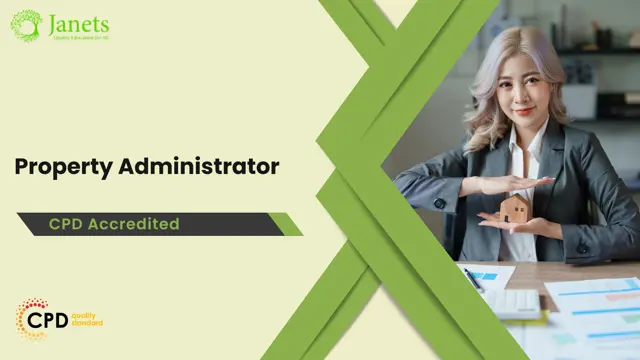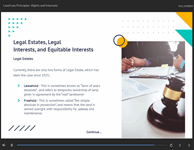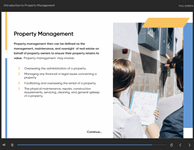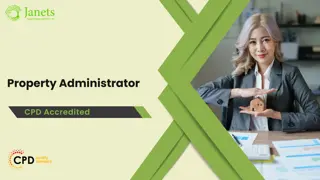
Property Administrator
*Offer Ends Soon* FREE PDF Certificate | Audio Visual Training | Tutor Support | 1 Year Access
Janets
Summary
- CPD Accredited PDF Certificate - Free
- CPD Accredited Hard Copy Certificate - £15.99
- Exam(s) / assessment(s) is included in price
- Tutor is available to students
Add to basket or enquire
Overview
The UK property sector is a dynamic tapestry, interwoven with countless opportunities. With a significant shift towards the private rented sector and changing tenant preferences, property administration emerges as a pivotal role. This Property Administrator course unveils the myriad facets of property management, from intricate land laws to effective marketing strategies. Understand the changing landscape, and arm yourself with the knowledge to seize the myriad opportunities it presents. Immerse in a curriculum thoughtfully crafted, ensuring you're poised for success in the vibrant world of property administration. Dive in and embark on a journey towards becoming a proficient Property Administrator.
Learning Outcomes:
- Comprehend core concepts of property management in the UK.
- Discern the responsibilities of property administrators.
- Recognise the significance of legal frameworks in property management.
- Identify and apply effective property marketing techniques.
- Understand key principles underpinning land and property law.
- Navigate mortgage, insurance, and property licensing processes.
What You Get Out Of Studying With Janets
- Free PDF certificate upon successful completion of the course
- Full one-year access to course materials
- Instant assessment results
- Full tutor support available from Monday to Friday
- Study the course at your own pace
- Accessible, informative modules taught by expert instructors
- Get 24/7 help or advice from our email and live chat teams with the training
- Study at your own time through your computer, tablet or mobile device
- Improve your chance of gaining valuable skills by completing the course
Enrol in the Property Administrator course to find out more about the topic and get one step closer to reaching your desired success!!
CPD
Course media
Description
Property Administrator Course Curriculum:
Module 1: Introduction to Property Management
- What Is Property Management?
- The Property Management Company
- Why Landlords Contract Management Companies?
- Legal Requirements for Property Managers
- Why Is Property Management a Great Career?
- Summary
- Assessment
Module 2: The Role and Responsibilities of a Property Manager
- The Landlord – Property Manager Relationship
- The Services a Property Manager Can Provide
- Ensuring Maximum Occupancy
- Upgrades and Improvements
- Phasing Repairs
- Summary
- Assessment
Module 3: Skills of an Effective Administrator
- Introduction
- Three Skills Approach
- Technical Skills
- Human Skills
- Conceptual Skills
- Tips on How to Develop These Skills
- Technical Skills
- Human Skills
- Conceptual Skills
- Summary
- Assessment
Module 4: Listing Properties and Marketing
- Registering Landlord and Property Details
- Property Valuations and Appraisals
- Consents to Let the Property
- Advice on Presentation of the Property
- The Sales Pitch
- Information to Record
- Photographs
- Creating Eye-catching Adverts for Properties
- Service Agreements
- Property Details Form
- Verifying Ownership of the Property
- Summary
- Assessment
Module 5: The Letting Process and Tenancy Agreement
- Registering Potential Applicants’ Details
- Viewings
- Safety and Security
- Processing Applications
- Tenant Application Forms
- Vetting Prospective Tenants
- Guarantors
- Communications with the Landlord And Applicants
- Inventory and Schedule of Condition
- Tenancy Agreements and Types of Tenancy
- Executing the Tenancy Agreement
- Other Documents
- Check-In Process
- Post-Check-In Procedures
- Serving Notice and Notice Periods
- Landlord Giving Notice to Tenant
- Tenant Giving Notice to Landlord
- Summary
- Assessment
Module 6: The Property Management Process
- Property Management Overview
- Rent Collection
- Dealing with Late Payments
- Property Inspections
- Maintenance and Repairs
- Qualifying Suitable Contractors
- Planning for Maintenance Work
- Major Works
- Paying Contractors
- Tenancy Renewals
- Rental Increases
- Check-Out Process
- Claims for Dilapidations
- Returning the Deposit
- Dealing with Problem Tenants and Other Issues
- Useful Resources
- Summary
- Assessment
Module 7: Regulations of Property Management
- Are Letting/Managing Agents Regulated?
- The Requirement to Join a Redress Scheme
- Complaining About a Letting/Managing Agent
- Letting Agent Fees
- Client Money Protection
- General Information for Landlords and Tenants
- Summary
- Assessment
Module 8: Changes in the UK Property Market: An Opportunity
- The Growth of the Private Rented Sector
- Tenant Preferences in Renting
- Generation Rent and Millennials
- The Emergence and Growth of Build to Rent
- The Emergence of Co-Living
- Summary
- Assessment
Module 9: Land Law Principles- Rights and Interests
- Legal Estates, Legal Interests, and Equitable Interests
- Formalities for the Land
- Protecting Third Party Interests
- Easements to Use the Land
- Covenants
- Trusts of Lands
- Co-Ownership
- Mortgages
- Adverse Possession
- Summary
- Assessment
Module 10: Registered and Unregistered Land
- Basic Concept of Registration System
- Characteristics of the English Land Registration System
- Enforceability and Priority of Interests Under the Land Registration Act 2002
- Overriding Interests
- Indemnity
- Difference Between Registered and Unregistered Land
- Summary
- Assessments
Module 11: Ownership and Possession of the Property
- The Nature of Ownership
- The Roles Played by Ownership
- The Limitations of Ownership
- Fragmentation of Ownership
- The Nature of Possession
- Possession of Land
- Possession of Goods: Bailment
- Protection of Possession
- Summary
- Assessment
Module 12: Co-Ownership in Property
- The Joint Tenancies and Tenancies in Common
- Other Forms of Co-Ownership
- Summary
- Assessments
Module 13: Leases and Bailment
- Leases and Bailments Compared
- Leases
- Bailment
- Summary
- Assessment
Module 14: Property Law: License
- What is Property Licensing?
- How Long Will the Licence Last?
- What Happens if Somebody Fails to Apply for a Licence?
- Key Outcomes of Property Licensing
- Licenses in Property Law
- Licences Arising Out of an Estoppel
- Summary
- Assessment
Module 15: The Mortgage Law
- The Basic Concept of Mortgage
- Types of Mortgage
- The Mortgage Offer
- Instructions to Act
- Conflict of Interest
- Reporting to the Lender
- The Mortgage Documentation
- Summary
- Assessment
Module 16: Insurance for Property Maintenance
- Risk in the Property
- Insuring Property
- Property at Sellers Risk
- Property at Buyers Risk
- Maintenance of Sellers Policy
- Other Types of Insurance
- Summary
- Assessment
Who is this course for?
The Property Administrator is ideal for those who already work in this sector or are an aspiring professional. This course is designed to enhance your expertise and boost your CV.
Requirements
The Property Administrator is open to all students and has no formal entry requirements. To study the Property Administrator course, you only need a passion for learning a good understanding of English, numeracy, and IT skills. You must also be over the age of 16.
Career path
This Property Administrator course will assist you to get your desired job in the relevant field, including:
- Property Manager - £25K to £40K/year.
- Lettings Negotiator - £18K to £30K/year.
- Property Valuer - £22K to £37K/year.
- Lease Administrator - £20K to £35K/year.
- Maintenance Coordinator - £19K to £32K/year.
Questions and answers
Currently there are no Q&As for this course. Be the first to ask a question.
Certificates
CPD Accredited PDF Certificate
Digital certificate - Included
CPD Accredited Hard Copy Certificate
Hard copy certificate - £15.99
A physical, high-quality copy of your certificate will be printed and mailed to you for only £15.99.
For students within the United Kingdom, there will be no additional charge for postage and packaging. For students outside the United Kingdom, there will be an additional £10 fee for international shipping.
Reviews
Currently there are no reviews for this course. Be the first to leave a review.
Legal information
This course is advertised on reed.co.uk by the Course Provider, whose terms and conditions apply. Purchases are made directly from the Course Provider, and as such, content and materials are supplied by the Course Provider directly. Reed is acting as agent and not reseller in relation to this course. Reed's only responsibility is to facilitate your payment for the course. It is your responsibility to review and agree to the Course Provider's terms and conditions and satisfy yourself as to the suitability of the course you intend to purchase. Reed will not have any responsibility for the content of the course and/or associated materials.







